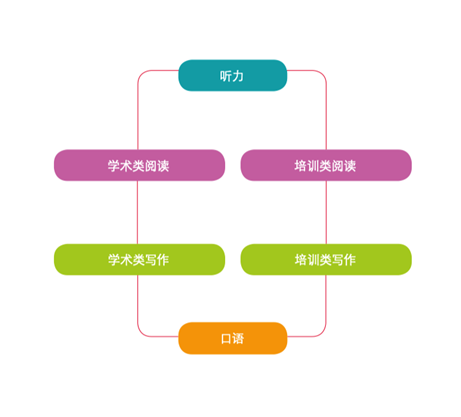Teaching strength
Current position: Home > Teaching strength > IELTS
IELTS

I.IELTS Course Introduction
IELTS(International English Language Test System)S isan English Language Proficiency test which is designed to test the language ability of people who want to study or work in countries (or regions) where English is used as the language of communication. IELTS is divided intoAcademicModule andGeneralTrainingModule. According to the regulations of the Immigration Bureau, all students who apply for undergraduate courses and degrees in English-speaking countries are required to take the IELTS. IELTS has a world-class reputation and is recognized by all institutions of higher learning in the Commonwealth and the vast majority (more than 3000) of American institutions.
The IELTS is a test of communicative Competence in English. It examines all aspects.IELTS is a test of English communicative competence with acomprehensive test of English abilities - listening, speaking, reading and writing. The IELTSAcademicModule is designed to reflect the students' ability to learn and live in English in a foreign university environment. In order to achieve ideal results in IELTS, the key is to improve English in an all-round way and strengthen the ability to communicate in English, whichis also the goals and objectivesoflanguage learningfor studentsinour school.
The Language Center of School of International Education is the core part of the provincial Foreign Language Experimental Teaching Demonstration Center demonstration Center in Guangdong University of Technology. Through scientific and systematic pre-school diagnostic assessment, the center tailors learning plans and learning objectives for students, providing students with a unique language learning experience in the School of International Education. Moreover, the Centre employs teachers with rich teaching experience and excellent language skills to teach IELTS courses, ensuring that students acquire the academic English skills needed to complete their degree in English-speaking countries, which is regarded as the primary teaching objective of English courses offered in the School of International Education.
Listening
Students are expected to be familiar with common listening scenes, master 2000 high-frequency words of listening scenes,understand common language phenomena, and master the answering methods and skills of various listening questions.

Speaking
Students are expected to improve their pronunciation and intonation andfluency of expression, befamiliar withthescoring standards as well as test topics and answer skillsofIELTS, learn authentic English expression so as to improve IELTS oral performance.

Reading
Students are expected to learn the core strategies and skills of academic reading, master the knowledge of academic texts, and expand the English vocabulary. Through special training and comprehensive language learning, the speed and accuracy of answering questions can be improved.

Writing
Students are expected to consolidate the foundation of grammar andvocabulary, comprehensively improve the academic writingskillfrom single sentences, paragraphs to chapters, and be able to complete the IELTS essay with clear ideas, complete structure and smooth language within the limited time.

The School of International Education is committed to building a language learning center with distinctive features and advanced software and hardware. Under the guidance of Chinese teachers and foreign teachers, students canfocus on application andpractice,comprehensively improve their English proficiency, enhance their understanding of English-speaking countries, broaden their cultural horizon, and prepare themselves for overseas professional learning taught in English.
Our goal isto develop students into international talentswith greatproficiency in English writing and speaking.

II. Introduction to IELTS

1.Audition
Time
About 30 minutes (and 10 minutes to write the answer sheet)
Issue
There are 40 questions in the listening test.There are a variety of test types:Multiple choice, information matching, marking plans/maps or diagrams, filling in forms, completing notes, completing flow diagrams, completing reviews, completing sentences, answering short questions and answers, etc
The test part
There are four parts to the listening test:
The first part is a conversation between two people in a daily communication scenario (for example, a conversation at a lodging agency).
The second part is a monologue in a daily communication scene (for example, a talk about local facilities or a conversation about arranging meals for certain meetings).
The third part is no more than 4 person conversations on education or training-related topics (e.g., research assignments between college tutors and students, or research projects planned by a group of students).
Part FOUR is a monologue on an academic topic (e.g., a university speech).
Listen to each part only once.In the listening test, you can hear accents from many English-speaking countries.
Testing skills
The listening test is designed to test a range of skills, including:
Ability to understand the main idea of the dialogue
Ability to understand specific facts
Ability to understand the views, attitudes and objectives of speakers
Understand how the argument unfolds
Grade
One point is awarded for each correct answer. The total score of listening test is 40 points. Candidates will be graded on a scale of 1 to 9 based on their original score.
The fraction may be integer or half.
2.Read
Time
60 minutes (no extra time to write an answer)
Issue
Types of 40 questions, questions are multiple choice, judge right and wrong (true/false/not provide answers), the judgment of the author's opinion/statement (yes/no/not provide answers), title, matching, feature matching, last word matching, complete the sentences, sentence complete overview, annotation, complete diagram and flow chart, complete diagram mark, short answer.
The test part
There are three parts in the reading exam. The overall length of the article is 2150 to 2750 words.
Academic Reading
Each part is a long passage. The content of the article is from books, journals, magazines and newspapers of academic topics of public concern. Reading these articles does not require a professional background. The article is suitable for candidates who want to pursue an undergraduate or graduate degree and obtain other professional qualifications. The form of the article includes descriptive text and factual text and its extension and analysis. In addition, there are non-written materials, such as graphics, tables or photographs. If technical terms are included in the article, a simple vocabulary is provided.
Training Reading
The first part includes 2-3 paragraphs of factual text, one of which may be a comprehensive article (including 6-8 paragraphs of short text on similar topics, such as hotel advertising. The content of the article is related to daily life in English-speaking countries.
The second part includes two short paragraphs, mainly related to work (e.g., application for work, company policy, salary and other conditions, workplace facilities, employee development and training).
The third part includes a long and complex text, which is a topic of public interest. Words are words that are actually found in notices, advertisements, company manuals, official documents, books, magazines and newspapers.
Testing skills
The reading test is designed to test candidates for a range of skills, including:
Ability to read and understand the gist of the article
The ability to understand the main meaning through reading
The ability to read details
Ability to understand inferences and implications
Recognize the author's opinion, attitude and purpose
Understand the beginning of the argument
Score
One point for each correct answer. A total of 40 points, candidates according to their original scores to obtain 1-9 points of grade.
Fractions can be integer or half.
3. Writing
Time
60 minutes
Mandate
There are two tasks. The first task requires at least 150 words and the second at least 250 words.
Academic Writing
Writing Task 1 requires you to describe, summarize, or interpret the information provided to you in your own language based on the figures and tables provided. You need to complete the description and interpretation of information, describe the different stages of a process, how a thing functions or describe an object or thing.
In Writing Task 2, you need to respond to the ideas, arguments, or questions given and complete an article.
The questions raised are of public interest and are appropriate and easy to understand for those who take the examination to pursue an undergraduate or postgraduate degree or apply for professional registration. answers to tasks 1 and 2 should be in the style, semi-formal or formal style of academic writing.
Training Writing
Writing Task 1 requires you to write a letter or explain the specific situation according to the information provided. The form of this letter may be informal, semi-formal or formal.
In Writing Task 2, you need to respond to a given point of view, argument, or question and complete an article. This article may be slightly individualized in form compared with the article of task 2.
Related topics are of public interest.
Testing skills
Two writing tasks are designed to test your English writing skills. Your answers should meet the requirements in the following areas:
Content
Organization of views
Accuracy and scope of vocabulary and grammar
Academic Writing:According to different types of questions, Writing Task 1 requires you to demonstrate the ability to organize, present, or compare data in English, describe the stages of a process, describe a thing, event, or event process, and explain how something works.
According to different types of questions, writing task 2 requires you to show your ability to express in English how to solve problems, how to express and judge a certain opinion, how to compare evidence, opinions and meanings, and how to evaluate and question opinions, evidence, or judgments.
Training writing:according to different types of questions, writing task 1 requires you to show your ability to obtain or provide general factual information in personal letters, express needs, requirements, likes and dislikes, and express your opinions (opinions, complaints) in English.
According to different types of questions, writing task 2 requires your ability to express general factual information in English, outline or propose a solution, demonstrate an opinion, and evaluate arguments and opinions.
Score
According to the writing test scoring criteria (completion of tasks, coherence and cohesion, vocabulary richness, grammatical diversity and accuracy), the IELTS IELTS examiner with professional qualifications will evaluate your completion of each task. For scoring criteria, please see www.ielts.org/criteria.
The proportion of task 2 in the whole writing score is twice that of task 1.
A fraction can be an integer or a half.
4.Oral English
Time
About 11 to 14 minutes
Examination section
There are three parts in the oral examination.
Part one: Self-introduction and short Q & A (4 to 5 minutes) The examiner will introduce yourself and ask you to make a brief self-introduction and identify you. The examiner will ask several simple questions related to you, such as family, family life, work, study and interest.
Part two: personal statement (3 to 4 minutes) the examiner will give you a task card, which will give you a topic and answer points. You have one minute of lead time during which you can take notes using the paper and pen provided. Then make a 1 to 2 minute statement on the topic. The examiner will ask you one or two questions on the same topic.
The third part: two-way discussion (4 to 5 minutes) the examiner will have a deeper two-way discussion with the examinee on the topic of the second part.
Testing skills
The oral exam is designed to test candidates for a range of skills, including:
Ability to communicate in the form of answering questions about everyday ideas and information, common life experiences or situations
The ability to organize ideas and talk for a long time on a topic through the use of appropriate language
Ability to express and discuss opinions, analyze, discuss, and think deeply about problems.
Score
IELTS IELTS examiners with professional qualifications assess your performance throughout the test according to the IELTS IELTS oral scoring criteria (fluency and consistency, vocabulary diversity, grammatical diversity and accuracy, pronunciation) for the test. For scoring criteria, please see www.ielts.org/criteria.
A fraction can be an integer or a half.
Note: official profile from IELTS test. Click Download:https://takeielts.britishcouncil.org/sites/default/files/2018-01/ielts-information-for-candidates-simplified-chinese.pdf
III. Web-based learning resources
① IELTS China Website::https://www.chinaielts.org
In addition to the official IELTS examination registration website, the website is also a valuable learning resource: detailed introduction of IELTS questions and provide simulation questions for download and self-test, free online open classes, Release official lecture series information, and give many expert suggestions for preparing for exams.
② English Learning Website of the British Association for Cultural Education:http://learnenglish.britishcouncil.org.cn
The British Council (British Council) is one of the organizers of the IELTS test. Its English learning website (LearnEnglish) provides a variety of listening, speaking, reading and writing learning materials for all ages and occupations. It offers a course (MOOC) to introduce the language and culture of English-speaking countries, and a column on IELTS tips.
③ China Daily::http://language.chinadaily.com.cn
The language learning website of China Daily, the most authoritative English newspaper in China. In addition to reporting bilingual news to provide excellent reading materials, there are vocabulary, listening, oral learning column, but also wonderful film and television appreciation. A deep collaboration with the BBC's (BBC) teaching channel, the site features classic sections such as authentic English and carry-on English.
④ IELTS Road:http://www.roadtoielts.com
or Chinese version:http://roadtoielts.chinaielts.org
British Council official IELTS preparation online course. The course is divided into free and paid versions. Even if you only register for a free version, you can get valuable IELTS preparation advice and online mock test opportunities.
⑤Quality IELTS
British Future Learn Network:https://www.futurelearn.com/Search IELTS, attend two official courses: Understanding IELTS and Inside IELTS
American EDX Network:https://www.edx.org/Search IELTS, to participate in the IELTS Academic Test Preparation course of the University of Quinlan.
⑥Public number and APP
Chinese Daily News, CHINADAILY、BBC English, etc
APP: daily English listening (IELTS listening all audio), FiF oral training (student version), small station IELTS, IELTS Word Power (British Council), European Dictionary (can add authoritative dictionary), Quizlet( free word card tools) and so on


